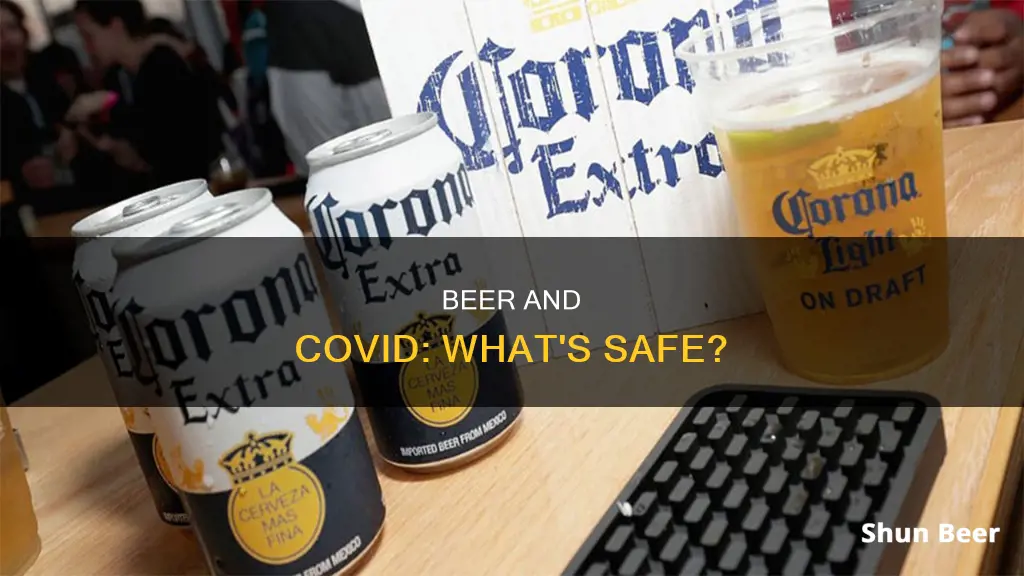
The COVID-19 pandemic has had a profound impact on people's lives, with many experiencing increased stress and anxiety. As a result, alcohol sales have surged, with people turning to drinks like beer and wine to cope with the challenges of the pandemic. While moderate drinking can have some health benefits, excessive alcohol consumption can weaken the immune system and increase the risk of respiratory illnesses like COVID-19. It's important to be mindful of drinking habits, especially during a public health crisis, as alcohol can impair judgement and make it harder to follow safety protocols like mask-wearing and social distancing. This complex relationship between alcohol and COVID-19 has led to research and discussions on the potential risks and consequences of drinking during this time.
| Characteristics | Values |
|---|---|
| Alcohol's impact on the immune system | Alcohol can weaken the immune system and reduce its ability to fight off infection. |
| Alcohol consumption during the pandemic | Alcohol sales rose nearly 27% during the first nine weeks of the pandemic. |
| Alcohol and COVID-19 vaccine | There is no conclusive evidence that alcohol reduces the vaccine's effectiveness. |
| Alcohol and social distancing | Alcohol can make it harder to adhere to safer gathering practices like wearing a mask and social distancing. |
| Official advice | There is no official advice to avoid drinking alcohol after or before the COVID-19 vaccine. |
| Alcohol and health | Excessive drinking can lead to serious health issues like acute respiratory distress syndrome and pneumonia, which are associated with COVID-19. |
| Alcohol alternatives | Alternatives to alcohol include mocktails, meditation, and vigorous exercise. |
What You'll Learn

Alcohol does not protect you from COVID-19
The World Health Organization (WHO) has stated that drinking alcohol offers no protection against COVID-19. This statement was made to address the misinformation circulating online that suggested drinking alcohol could "kill the deadly virus".
Alcohol's Effects on the Body
Alcohol is known to have harmful effects on the body and can increase the risk of injury, violence, and alcohol poisoning. During the COVID-19 pandemic, increased alcohol consumption can negatively impact health, encourage risk-taking behaviours, and exacerbate mental health issues and violent tendencies.
Alcohol and the Immune System
Alcohol compromises the immune system, making the body more susceptible to diseases and adverse health outcomes. It disrupts immune pathways and impairs the body's ability to defend itself against infections. This can increase the risk of developing immune-related conditions, such as acute respiratory stress syndrome (wet lung).
Alcohol and COVID-19 Vaccines
While there is no conclusive evidence that alcohol reduces the effectiveness of COVID-19 vaccines, some studies suggest that alcohol consumption may negatively impact the vaccination process. Alcohol may activate ACE2 receptors, which are the entry points for the COVID-19 virus, and enhance the harmful effects of the SARS-CoV-2 spike protein.
Protecting Yourself from COVID-19
According to the WHO, the most effective way to protect yourself against COVID-19 is by frequently cleaning your hands with an alcohol-based hand sanitiser or by washing them with soap and water.
The Science of Beer: Foam Detectors Explained
You may want to see also

Drinking alcohol can make it harder to follow safety measures
Alcohol consumption can impair your thoughts, judgement, and decision-making abilities, making it harder to follow safety measures such as wearing a mask and social distancing. This impairment can also lead to a false sense of security, causing you to underestimate the risks associated with COVID-19.
Additionally, alcohol can negatively impact your sleep quality by interrupting your circadian rhythm and inhibiting REM sleep. Poor sleep further weakens your immune system, making it more difficult for your body to fight off infections.
Drinking alcohol also weakens your body's ability to fight infections and increases the risk of developing respiratory issues such as acute respiratory distress syndrome and pneumonia, which are associated with COVID-19. Alcohol damages the immune cells and fine hairs in the lungs, making it harder for your body to clear infections.
Furthermore, alcohol can alter the health of your gut by destroying key microorganisms that support the immune system and damaging the immune cells lining the intestines. This damage can make it more challenging for your body to defend against viruses like COVID-19 and increase the likelihood of severe health complications if you become infected.
Therefore, it is essential to be mindful of your drinking habits during the pandemic, especially if you are at high risk of COVID-19 or have pre-existing conditions.
Beer and GERD: What You Need to Know
You may want to see also

Alcohol weakens your body's ability to fight infections
Secondly, alcohol can impact the immune cells in the lungs, reducing their ability to remove mucus and leading to a weakening of lung function over time. This can result in a higher risk of developing serious conditions such as pneumonia from common respiratory tract infections.
Thirdly, alcohol can disrupt the balance of bacteria in the gut microbiome, which is crucial for healthy immune function. It can kill the good bacteria, allowing bad bacteria to grow unchecked, leading to problems with digestion, inflammation, and organ damage.
Additionally, alcohol consumption is linked to a higher risk of developing acute respiratory stress syndrome, sepsis, alcoholic liver disease, certain cancers, and other immune-related health issues. It can also slow down the recovery process from infections and physical trauma, including poor wound healing.
Overall, alcohol has complex and detrimental effects on the immune system, making it harder for the body to defend itself against infections and diseases.
Beer and Nasal Spray: A Safe Mix?
You may want to see also

Drinking alcohol may blunt the immune response to the COVID-19 vaccine
Alcohol is known to have a negative impact on the immune system. It affects the immune system in complex and paradoxical ways, disrupting immune pathways and impairing the body's ability to defend itself against infection. This can increase the risk of infection and disease, including respiratory issues such as pneumonia and acute respiratory stress syndrome.
The impact of alcohol on the immune system is dose-dependent, with moderate drinking associated with reduced inflammation and improved responses to vaccination, and heavy drinking linked to a decreased frequency of lymphocytes and increased risk of bacterial and viral infections.
There is no conclusive evidence that alcohol reduces the effectiveness of the COVID-19 vaccine. However, some studies suggest that alcohol may activate ACE2 receptors, which are also the receptors for the COVID-19 virus. This could enhance the harmful effects of the SARS-CoV-2 spike protein. Additionally, chronic alcohol consumption may exacerbate heart problems after receiving an mRNA COVID-19 vaccine, particularly for those with underlying cardiovascular issues.
While there is no official advice to avoid alcohol after receiving the COVID-19 vaccine, it is important to note that alcohol can affect the immune system. Therefore, excessive drinking may impair the body's ability to respond to the vaccine and increase the risk of adverse effects. As such, it is generally recommended to drink in moderation to lower the risk of alcohol impacting the immune system.
Beer, Guns, and Georgia Laws: What's Allowed?
You may want to see also

Alcohol can negatively impact sleep quality
Secondly, alcohol can interfere with and aggravate sleep disorders such as snoring and sleep apnea. Alcohol causes tongue and throat muscles to relax and increases airway resistance in the nasal passages, leading to more frequent and longer breathing pauses during sleep. It also affects people with central sleep apnea by interfering with the brain's ability to receive chemical messages involved in breathing.
Thirdly, heavy alcohol use can contribute to the development of insomnia, with as many as three-quarters of people with alcohol dependence experiencing insomnia symptoms. Conversely, people with insomnia are also at an increased risk of developing alcohol use disorder, as they may turn to alcohol as a sleep aid. This can create a destructive pattern where individuals drink to fall asleep but experience poor sleep and increased sleepiness during the day, leading them to rely on caffeine, which further disrupts their sleep.
Finally, alcohol use and dependence can interfere with circadian rhythms, or biological patterns that operate on a 24-hour clock. Alcohol may decrease the body's sensitivity to cues like daylight and darkness, which are important for the sleep-wake cycle. This can result in feeling alert when one wants to sleep and sleepy when one wants to be awake.
Pensacola Beach's Beer Laws: Drinking Scenarios Explained
You may want to see also
Frequently asked questions
There is no official advice to avoid drinking alcohol after getting a COVID-19 vaccine. However, alcohol can affect the immune system, and some research suggests that people who drink excessive amounts may have adverse effects if they drink alcohol after getting the vaccine.
Drinking alcohol does not protect you from COVID-19. In fact, it can make it harder to adhere to safer gathering practices like wearing a mask and social distancing. Alcohol also weakens your body's ability to fight infections, increasing the risk of complications, and making it harder to get better if you are sick.
There is no official advice to avoid drinking alcohol before getting a COVID-19 vaccine. However, some organizations advise people to avoid alcohol for at least 2 days before and at least 2 weeks after the vaccine.







